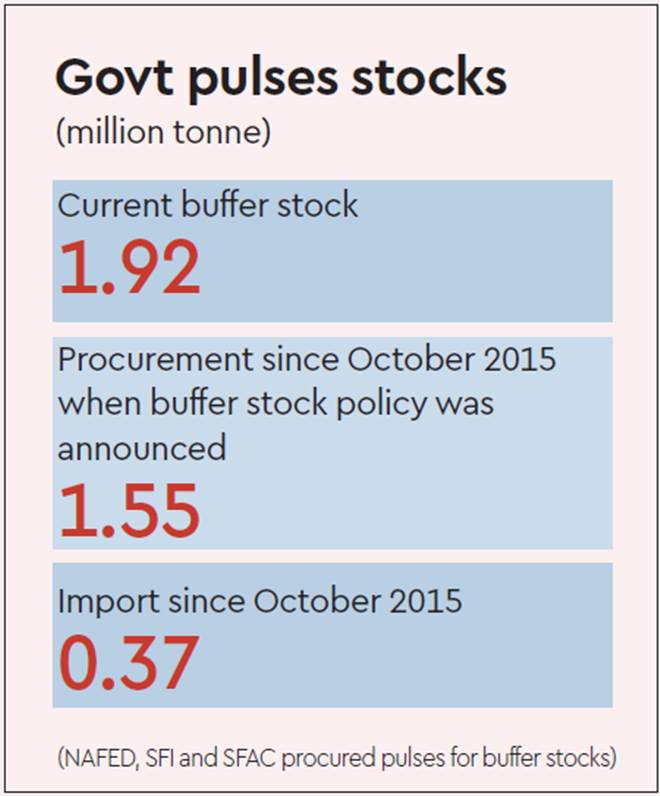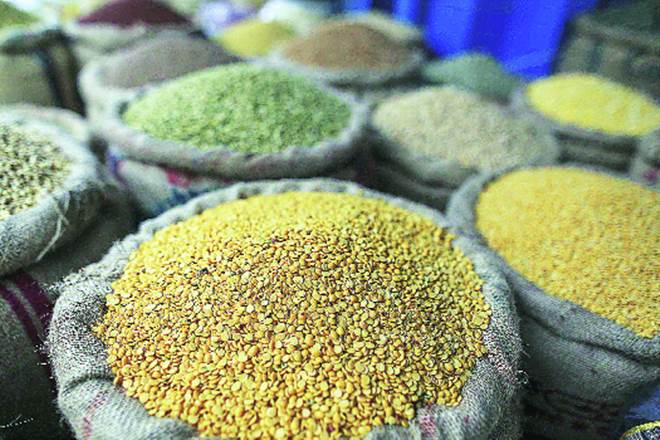The government has decided to sell pulses from buffer stocks in the market at the prevailing price in mandis across key producing states, including Madhya Pradesh, Maharashtra, Andhra Pradesh, Rajasthan, Telangana and Karnataka. Sources told FE that the department of consumers affairs (DoCA) has approved the sale of pulses buffer stocks from last year’s procurement by agri-cooperative NAFED, Food Corporation of India (FCI) and Small Farmers’ Agribusiness Consortium (SFAC) at the prevailing market price. Sources also said the prevailing mandi prices of most of unprocessed pulses are around Rs 35-Rs 40 per kg while the agencies purchased pulses at a rate of around `50 to Rs 55 per kg a year ago. The loss incurred is funded from the price stabilisation fund (PSF). At present, NAFED, FCI and SFAC have stocks of around 1.9 million tonne (MT) of arhar, urad, moong, masur and chana, out of which 1.5 MT was purchased during 2016-17 kharif and rabi seasons.
The pulses were procured under the PSF managed by DoCA (department of consumer affairs). Out of the total buffer stocks of around 1.9 MT, created mostly through procurement and imports by agencies such as NAFED, SFAC and FCI, NAFED has purchased 1.3 MT of pulses likes tur or arhar, urad and moong from farmers. “The open market sale of pulses would ensure that there would be sufficient space for storing pulses from the forthcoming kharif crops (2017) which is expected to arrive in the market within next one month,” an official told FE.

“The government’s decision to sell at this rate will definitely bring prices down but the agencies would get opportunity to offload the excess stocks,” said, Nitin Kalantri, secretary, Maharashtra Dal Miller Association Meanwhile, Karnataka has agreed to purchase around 100,000 tonne of pulses from the buffer stocks during the next 10 months. Nafed has supplied around 15000 tonne of arhar to Karnataka for distribution through public distribution system so far.
States like Andhra Pradesh and Tamil Nadu have shown interest in pulses purchase from NAFED. Army has also agreed to take around 70,000 tonne of pulses from buffer stocks. NAFED would launch an e-auction platform shortly where traders could sell and buy other agricultural commodities as well. According to fourth advance estimate, the pulse production during 2016-17 crop year (July-June) rose by more than 40% to 22.95 MT compared to previous year’s output of 16.35 mt.
According to agriculture ministry data, despite a sharp decline in arhar, overall kharif pulses sowing, till Friday, had been around 130.68 lakh hectare, which is about 3.5% less than compared with last year, indicating another bumper output like last year. Recently, the government had put imports of pigeon peas and arhar under the restricted category and fixed a quota of only 200,000 tonne per annum. Traders have been asking for similar import restricts on other varieties of pulses as well.


